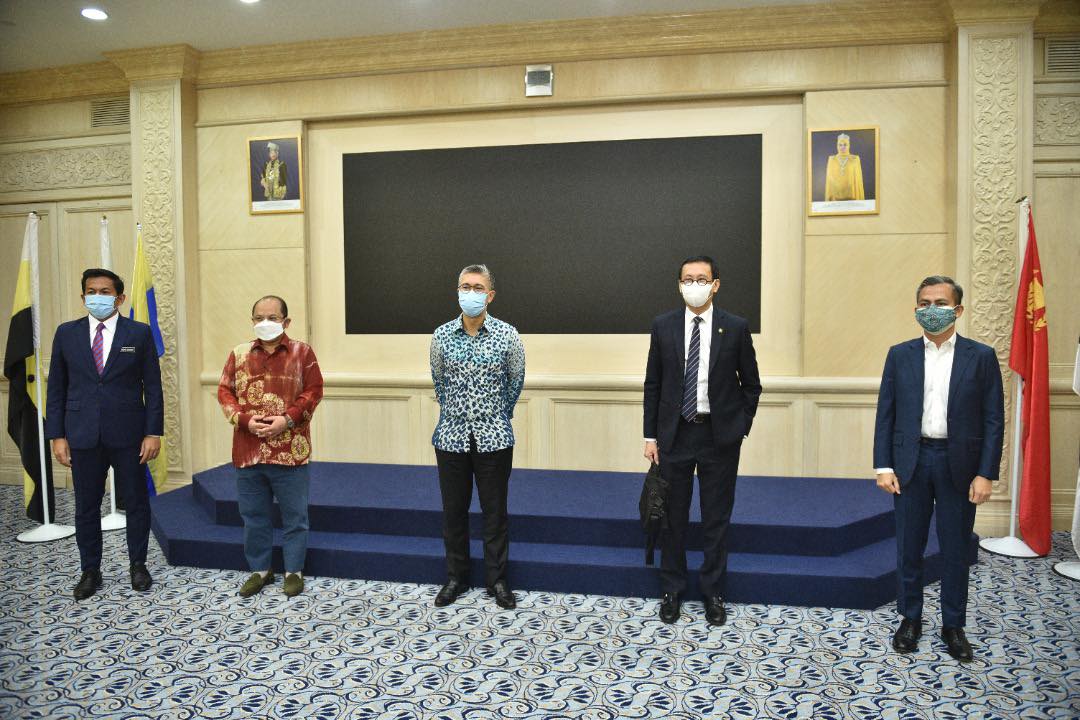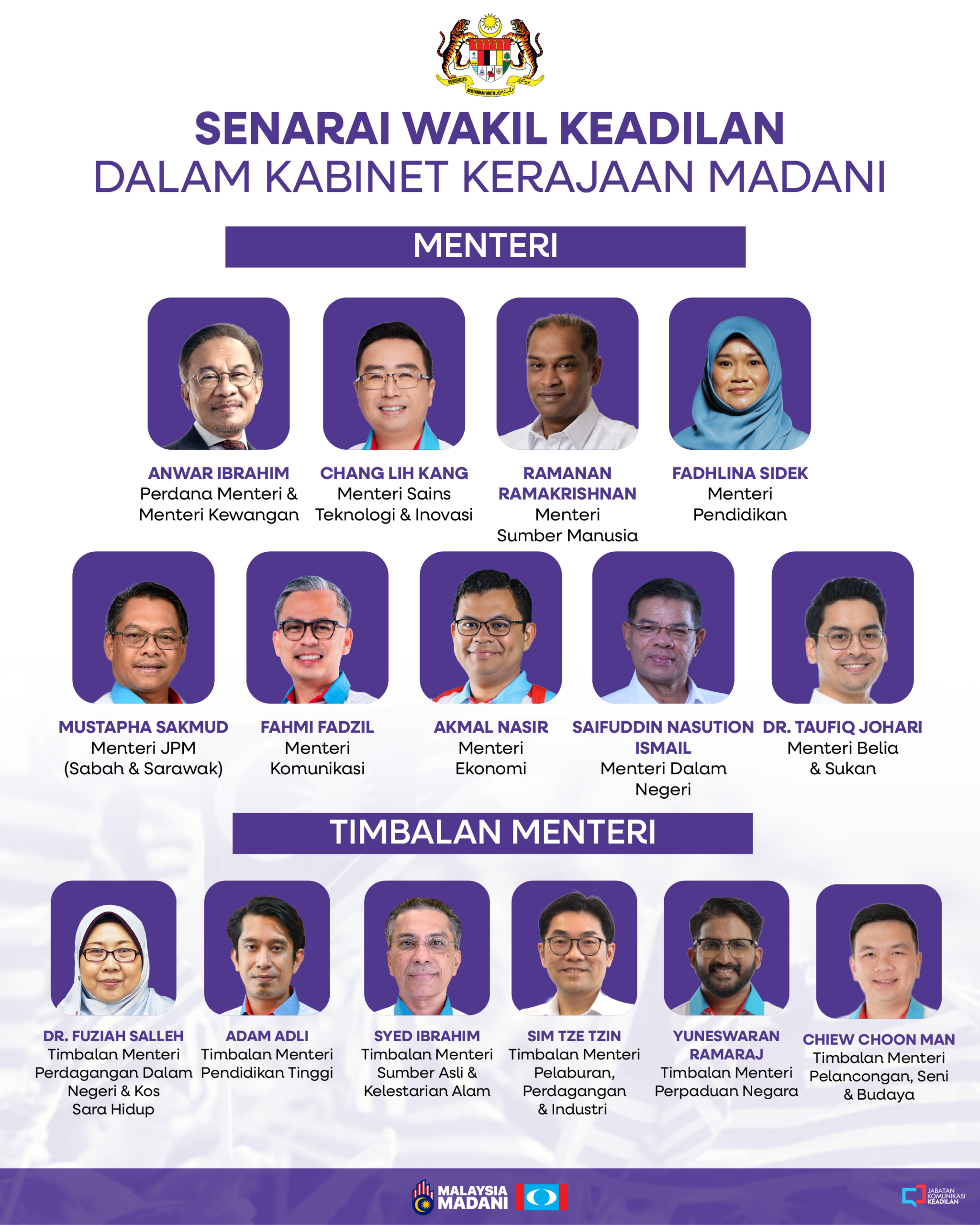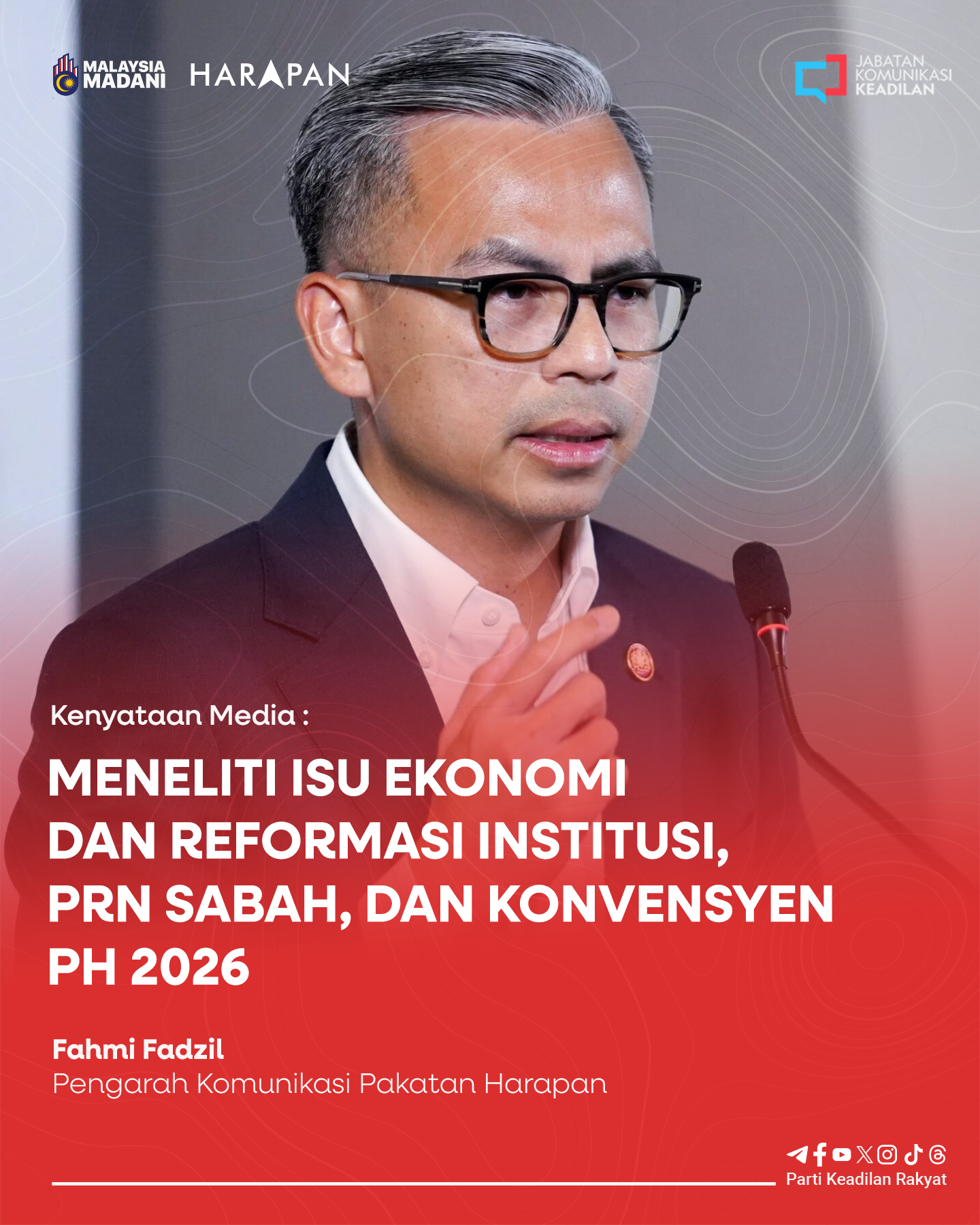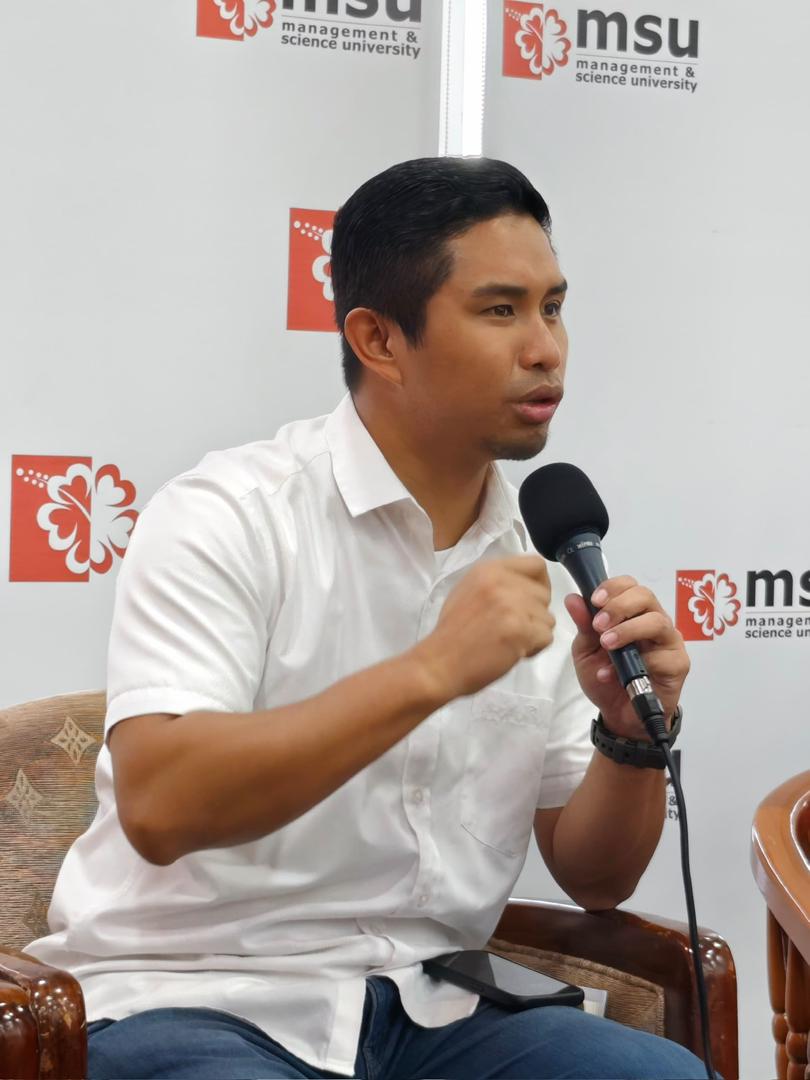

On 14th July 2021, I was asked by the KEADILAN leadership to attend a meeting with YB Senator Tengku Zafrul Aziz, the Minister of Finance (MoF), who is also the coordinating minister of Malaysia’s National Recovery Plan.
The meeting took place the following morning in the MoF office in Putrajaya from 10.30 am to 12 noon.
In attendance, from the KEADILAN side was YB Shamsul Iskandar (MP for Hang Tuah Jaya) and YB Fahmi Fadzil (MP for Lembah Pantai). On the side of MoF was YB Mohd Shahar Abdullah (MP for Paya Besar), Deputy Finance Minister, and six senior officers of MoF.
I was instructed to present KEADILAN’s views, notes, and policies and, in turn, receive, engage, absorb, and rejoin the views of the MoF. This article is not about the discussions that ensued during the meeting. I would only say that the meeting was overall honest and engaging.
This article is about the content of the PowerPoint presentation made by me. I had spent the evening of 14th July crafting out the presentation outlining some issues and policies that reflect the concerns and positions of KEADILAN, on the subject matter of “national recovery”. The views contained are sourced from other fellow MPs of KEADILAN during our weekly meetings. However, I think it is particularly right to give YB Dr Lee Boon Chye (MP for Gopeng) some credit. He has constantly provided good guidance to KEADILAN on public health policies.
KEADILAN: Issues and Policies on National Recovery
1.0 Current Situation:
The number of new daily infections are at record high levels, our public healthcare frontliners are fatigued, and a commentator on Bloomberg has said that Malaysia is staggering on the way to becoming a failed state.
2.0 The Challenges Ahead:
KEADILAN acknowledges the following challenges.
2.1 This is not a short-term crisis. The pandemic may drag on for another year or two; as such while we can hope for the best, we must prepare for the worst possible scenarios. Keeping a close eye on how countries with high vaccination rates, such as the UK and US, are coping with new variants will be extremely important to help shape future national policies to come.
2.2 There is no quick economic solution. The government should stop looking for a silver bullet and instead focus on improving fundamentals for national recovery. These fundamentals are reliable data and economic modelling, better testing and tracking, good SOPs with widespread public compliance, and a successful vaccination rollout.
3.0 Three Core Principles:
KEADILAN believes that all policies for national recovery must be grounded on the following three core principles:
3.1 The government must be guided by medical science and data.
3.2 The government must be fair to all individuals and groups.
3.3 The government must be transparent and accountable for its Covid-19 policy implementations and spendings.
4.0 Four Areas of Focus:
On the matter of national recovery, KEADILAN looked into four broad areas of focus:
4.1 Public Health
4.2 The Economy
4.3 Budget and Fiscal
4.4 Implementation Processes
5.0 Public Health
5.1 The root cause of the current economic crisis is caused by the failure of public health policy and substandard implementation. Therefore any national recovery plan must first address the issue of our failing public health system. The government too has to first admit that it had failed in its public health policy and then promptly reach out to other countries for assistance to acquire the best policy knowledge available. The first step for any recovery is to accept failure and then to ask for help.
Resources and Facilities:
5.2 The government has to mobilise immediately and ensure all public hospitals are properly funded and are able to operate with adequate resources such as ventilators and oxygen tanks. The current wave is growing and may hit peak at 20,000 new cases per day; time is of the essence.
5.3 The army must be mobilised to build more temporary field hospitals to meet this wave and to deploy army doctors and nurses too.
5.4 The private health sector must be further incentivised to treat more COVID-19 patients or alternatively take on more non-Covid patients from public hospitals. This will at least provide some breathing space for our public health frontliners.
5.5 The government must hire and train more para-medical, clerical and administrative staff to support public health doctors and nurses.
Vaccination Program:
5.6 Fully engage the private health sector to help carry out vaccinations via clinics and medical centres to further speed up the vaccination process.
5.7 To shift to “opt-out registration” policy for states where registration is below 80% by September 2021; a major concern being the very low registration rate of Sabah.
5.8 Acknowledging successes in Sarawak, more mobile vaccination teams should be deployed for rural and semi-rural areas.
5.9 There must be a stricter clampdown of corrupt practices and queue jumping in the vaccination program to shore up public confidence in the program.
Data and Science:
5.10 Publish monthly granular COVID-19 reports (as per Public Health England reports) so that analysts, academics and data scientists can assist to crunch numbers and create alternative policy models.
5.11 Make available all daily granular data to MPs and policymakers so that they can better understand the challenges on the ground.
5.12 Increase genome testing capacity to better track variants and to develop a strong variant monitoring team engaging leading scientists from other countries.
Testing and Tracing:
5.13 Set protocols and promote pool testing.
5.14 Increase exponentially the government’s capability for doing mass testing.
5.15 Mobilise tens of thousands of civil servants to contact trace via phone, focusing on behavioural interviews to identify potential spreads and then to counsel the possible infected persons.
6.0 The Economy
The Big Lockdown Question:
6.1 The government must provide answers on the “big lockdown” question that is on the minds of the people. The government must mobilise data scientists to do detailed modelling and disclose to the people whether the option for a full total lockdown of another 3 to 4 weeks can still work, or has the window of opportunity closed for good? The government need to also apologise for the half baked lockdowns over the last 8 weeks. which had thousands of MITI exemptions.
New Classification for Industries and Services:
6.2 We are of the view that the “Essential versus Non-essential” classification of industries and services does not work anymore. After 8 weeks of various MCOs, all non-essentials have become essentials.
6.3 We propose a new re-classification for industries and services, determined by which economic activities are high-risk or low risk. To achieve this, the government has to build the data collection infrastructure for risk assessment now and then back it by frequent periodic mass testing of industries and services.
Work:
6.4 Protecting jobs via wage subsidies should be given priority to stop insolvencies and unemployment. Many companies are facing extreme cash flow problems and mass insolvencies will be a reality in the next two months if things don’t quickly improve. As such, a full deployment of wage subsidies is needed now and the budget allocation must be substantial; at least a RM30 billion budget for 2021.
6.5 Lesser of a priority is the continued promotion and enabling work from home (WFH) programs, where internet bills and the purchase of computers for work should be subsidised.
6.6 For those who are required to work in offices and factories, more incentives need to be given for redesigning workspaces with better ventilation.
6.7 More focus and resources on the needs of the migrant workforce on their working conditions and living quarters, to stop hotspots from developing.
Financial Stability:
6.8 BNM to periodically report to Parliament on the financial state of banks.
6.9 BNM to disclose the effectiveness of private moratorium initiatives of the banks.
6.10 BNM to do modelling of the need and effectiveness of loan moratoriums for B40 and M40 consumer loans.
Investors, Currency and Stock Market
6.11 Government must quickly address the concerns of existing domestic and foreign investors, in light of a shakier Bursa, a weakened currency, and the published complaints from foreign business associations.
Education and Economic Scarring:
KEADILAN is extremely worried about the long term economic scarring from a failing education system:
6.12 Government must quickly address the issue of jobs for fresh graduates. Prolonged unemployment caused by the pandemic for a period of 2 to 3 years will scar deeply the future and capacities of fresh graduates.
6.13 Government must prioritise physical teaching for students facing crucial examinations.
6.14 Government must improve remote learning for all, with a fair distribution of computers and tablets, and subsidised internet access.
6.15 Government must take this period of nationwide school closure to carefully plan the SOPs when schools can eventually re-open, including periodic mass testing of students and teachers. There are many models available from successful countries on how to operate safe physical learning.
Budget and Fiscal:
7.1 Government has to account for all monies spent during the Emergency and reveal how much fiscal injection is needed for 2021.
7.2 Government must disclose the severity of the negative impact of EPF i-Sinar withdrawals on EPF’s ability to purchase MGS.
7.3 Government to report and provide a risk profile of foreign exposure to our bonds, and answer if we need to increase our external borrowings ceiling.
7.4 Government should direct BNM to do a detailed study on a short term, Covid specific quantitative easing program and to report the pros and cons of the same to Parliament.
7.5 Government should focus on distributional issues and prioritising in the following order; wage subsidy, direct cash transfer and lastly, outright grants. Percentages may vary and dependent on the quantum of available funds.
8.0 Implementation Processes:
8.1 KEADILAN believes the Emergency must end immediately and that a more inclusive approach, open to all parties and stakeholders is needed to implement a proper national recovery.
First and foremost, the Government needs to rethink how to regain trust and confidence from the people. Jailing recalcitrant celebrities who are repeat offenders and forcing ministers to resign for non-compliance of SOPs will be a good start.
8.2 Full transparency and accountability need to be instilled in the recovery plan with frequent Parliament sittings to provide checks and balances.
8.3 Form a joint select committee of government and opposition MPs to monitor the implementation of the recovery plan.
8.4 The Federal government to empower and finance state and local governments to do more in terms of welfare, mass testing and contact tracing so that effective and localised measures are deployed.
8.5 Facilitating and mobilising NGOs and volunteers to support especially in the areas of welfare, counselling for abuses, and mental stress.
Wong Chen
Subang MP





